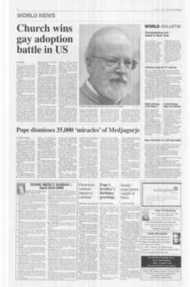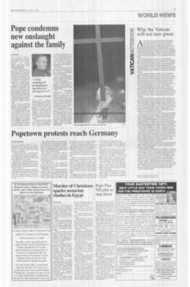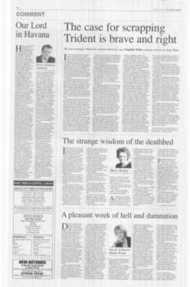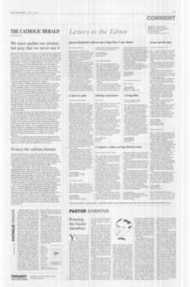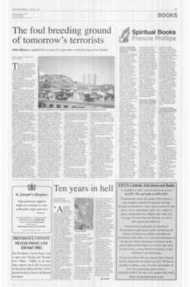Page 13, 21st April 2006
Page 13

Report an error
Noticed an error on this page?If you've noticed an error in this article please click here to report it.
Tags
Share
Related articles
Their Business W Books 6 Best-sellers
Symbols Of Salvation Hidden In Testimony
Requiescant In Pace
Bible At Busy Bedtimes
'monk's Alphabet' Launched Nigel Newton, Of Bloomsbury...
Spiritual Books
imarnriq Phillips
The Story of the Bible, by Henry Wansbrough OSB, Darton, Longman, Todd £10.95 For those who are ignorant of the origins and development of the Bible this book provides a brief, clear and readable guide. Dom Henry, translator and editor of the New Jerusalem Bible and a member of the Pontifical Biblical Commission, is well-suited to the task. Describing the Bible as a "collection of books — myth, folk history, propaganda, satire, laws, prayers, poetry, letters and fiction — all with the purpose of conveying the ways of God", his work demonstrates the difficulties of translation and selection that God's ways have encountered over the centuries. From the original Hebrew to the Greek Septuagint, from this to the Latin and finally to the vernacular is a fascinating story told with dry humour. There were "various shenanigans ... murder, concealment, black market rackets" involved in the Gospel of Thomas. Cardinal Newman, reflecting on the story of the Ten Commandments, asked: "Does God have fingers?" (If he doesn't, who did the writing on the wall at Belshazzar's feast?) Translations can be inspired. In Isaiah's prophesy the Hebrew has "young woman"; the Greek translation became "virgin" — a theological advance, as Dorn Henry points out. St Jerome, who coined the word "apocryphal", is seen as the genius behind the Latin translation; William Tyndale, a wordsmith who invented "scapegoat", "Passover" and a host of others, similarly "bestrides the English Bible". Indeed, the author feels the brilliance of Tyndale has never been surpassed; 80 per cent of the King James Bible, which has so shaped and formed the English language, was based on his translation. This prompts me to paraphrase Belloc: how odd of God to write in Hebrew — surely the King James English would do? He tells us that a 1534 copy of Tyndale's Genesis "fitted comfortably in the back pocket of my trousers" and discounts the idea of St Jerome befriending a lion. Bethlehem would have been unlikely terrain; more likely the Jordan valley where he himself had seen a leopard shot. Dom Henry also surveys the chief modern translations; Robert Speaight, on the panel of the Jerusalem Bible, admitted to him that he knew neither Greek nor Hebrew. I demur when he describes the line drawings of the Good News Bible as "thoughtful and witty". Well worth reading, especially for Catholics, whose knowledge of the Bible is often shaky; what I knew as a child came from having watched Cecil B De Mille's film The Ten Commandments three times — and I now learn from this book that Moses "authored" rather than actually wrote the books of the Pentateuch.
Discernment of Spirits, by Timothy M Gallagher OMV, Alban Books 05 This book is subtitled An lgnatian Guide for Everyday Living and it concerns the first week and set of rules of the Spiritual Exercises of St Ignatius. For those like myself who have never encountered these, the book is very instructive; indeed, I would recommend it as essential reading to all practitioners of psychotherapy. The "spirits" of the title which, in my ignorance. I had interpreted simply as otherworld beings, are more likely to be the stirrings of the heart: its joy, sadness, hope, fear, peace, anxiety and so on; what we call "high or low spirits". "Discernment" means awareness of these movements of the heart, coupled with an effort to understand and respond wisely to them. Like all great spiritual guides, Ignatius desired to help others overcome their selfish drives in order to grow closer to God. One of the book's strengths is its analysis of Ignatius' own spiritual journey, from wounded soldier daydreaming of glory to the insights he learnt at Manresa. Other saints' testimonies called upon include those of Augustine and Therese of Lisieux; there is also the dramatic
account of Thomas Merton's struggles and hesitations in becoming a Trappist and the less wellknown but, to my mind, more penetrating chronicle of Elizabeth Leseur, a Frenchwoman who died in 1914. These are most enlightening, particularly when juxtaposed beside the diaries and accounts of ordinary Christians, also included, who struggle with distractions, defeat and occasional desolation. Anyone who embarks on this journey will recognise the pitfalls mentioned here, known theologically as "the world, the devil and the flesh"; it's important to discern what tugs us back and why, and reassuring to know that "the enemy is essentially weak" in the face of the good angels and the Holy Spirit. The author shows how we can avoid being "bipolar" in our emotions, swinging from times of consolation to the very opposite and how to maintain a "spiritual equilibrium".
The Second Catholic Quiz Book, by Leo Madigan, Southwell Books £7 Reading this book is an excellent way to learn recondite facts and then parade them before others less knowledgeable. It is eclectic, wide-ranging (chapters include saints, shrines, history, literature and movies) and very amusing. At least, I could not help laughing at: "St Dymphna is patron of nervous diseases/cross eyes/slipped discs/flat feet" and "Where is the Casino of Pius IV: Las Vegas/Monte Carlo/San Marino/Vatican City?" No other religion provides such a feast of humorous possibilities.
I bet most readers won't know which pope died when the roof of the Vatican library fell on his head or what Vatican staff were expected to do when they answered the phone and found Pius XII on the line: "kneel/say Dominus tecum/genuflect/make the Sign of the Cross"?
I detected one error: the author asks: "Who died a papist in 1610?"
If hemeans the chap whose command of English clearly resonates with the King James Bible, he died in 1616.
blog comments powered by Disqus





